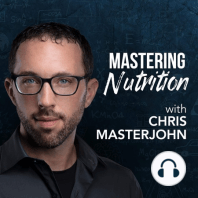27 min listen

Does mixing carbohydrate with fat cause people to get fat because of the Randle cycle? | Masterjohn Q&A Files #36
Does mixing carbohydrate with fat cause people to get fat because of the Randle cycle? | Masterjohn Q&A Files #36
ratings:
Length:
4 minutes
Released:
Dec 30, 2019
Format:
Podcast episode
Description
Question: Does mixing carbohydrate with fat cause people to get fat because of the Randle cycle? There's a theory floating around on the internet that mixed diets are more fattening than low-carb or low-fat diets because of the metabolic competition between glucose and fatty acids. I don't believe this to be true because, in the context of isocaloric diets, mixed diets don’t seem to be more fattening than low-carb or low-fat diets. Isocaloric diets are important for understanding physiological cause and effect, but they interfere with the real-life practical understanding of something. We want to use isocaloric science to study the academic question of, physiologically, are carbs and fat more fattening when combined than not combined. But, in real life, people eat more food on a mixed diet than they eat on a low-fat or low-carb diet. I think someone who says mixed diets are more fattening because of the Randle Cycle is totally misunderstanding this. They are more fattening because of the hyperpalatability factors that Stephan Guyenet has explained. Also, they probably are more likely to cause metabolic harm because of what Alex Leaf has explained about the Randle Cycle in his post, “Why you may reconsider buttering your potato” at Superhumanradio. He was arguing that you don't want to put butter on your potato because you have substrate competition between glucose and fatty acids, which makes it more difficult to clear the glucose from your blood and causes a compensatory higher insulin response. I'm not so insulin-centric that I believe that you necessarily always want to be minimizing your insulin response, and I definitely know that I have friends and colleagues who disagree with me on that, but I just don't view any disease, including type-2 diabetes, as a problem with hyperinsulinemia. The short of it is that the more you mix carbs and fat in your diet, the more likely you are to overeat. You don't necessarily overeat, but it's way more probable because it's hyperpalatable. The more you mix carbs and fat, the more you don't specialize in one or the other. What's the most efficient thing to do? If you eat a high-carb, low-fat diet your body specializes in burning carbs, you eat a high-fat, low-carb diet your body specializes in burning fat — and you're not going to do either of those as good if you're eating a mixed diet. Can you do them good enough? Often times, but if you have metabolic problems you might want to try a low-carb or a low-fat diet so you can specialize and be more efficient with your metabolism, because if you have metabolic problems whatever you're doing isn't working for you right now.
Released:
Dec 30, 2019
Format:
Podcast episode
Titles in the series (100)
003: The Sugar Conspiracy -- Trading One Nutritional Boogeyman for Another: In his April 7, 2016 piece in The Guardian, "The Sugar Conspiracy" Ian Leslie argues that the politics of nutrition has blinded us to the fact that sugar is more deserving than saturated fat of the status of dietary arch-villain and that the... by Mastering Nutrition